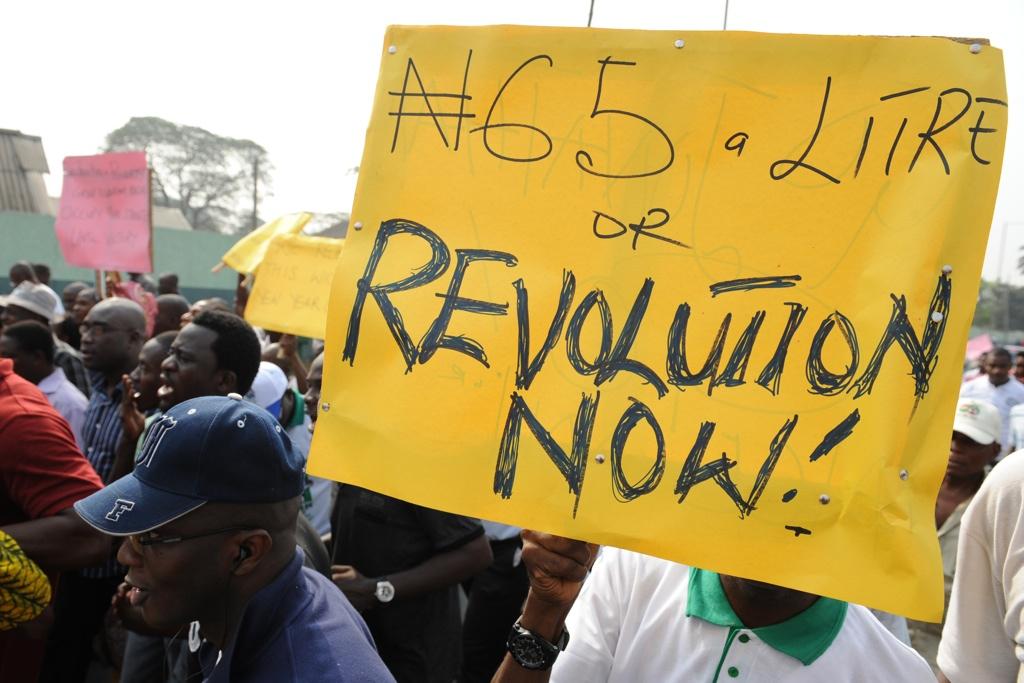Nigeria News: Trade unions call for strikes amid renewed violence
Nigerian union members and demonstrators march in Lagos to protest the removal of petroleum subsidies by the government on January 3, 2012. Nigerian police fired tear gas to disperse a small crowd burning tires in Lagos and arrested demonstrators in the northern city of Kano on Tuesday as protests continued over soaring fuel prices.
After the Nigerian government rejected an ultimatum set by Islamist militant group, Boko Haram, warning southerners to flee the mostly-Muslim north, at least 18 people have been killed and 20 wounded.
CNN reports at least eight killed, as gunmen attacked a revival church in Gombe, shooting worshipers who were fleeing the scene. BBC reports that 10 people were killed in another northeastern city, Mubi, after militants attacked a town hall meeting.
In both attacks the victims were reported to be ethnic Igbo people, southern Christians residing in northern Nigeria. Boko Haram has not taken credit for either attack, but local officials are already pointing the finger in their direction. Last month, Boko Haram took credit for a church bombing that killed dozens of people, and injured scores of others.
This new wave of violence comes amid calls for a nation wide strike against the removal of a decades-old fuel subsidy, a move that doubled gas prices. The removal of the subsidy was intended to free up funds to invest in infrastructure, like power and roads in Africa’s most populous country. But critics say in what is also known as Africa’s most corrupt country, the money is better kept in the hands of the Nigerian people through gas subsidies.
Bloomberg News reports that trade unions are calling for “indefinite strikes” that will shut down ports, oil companies, banks, and gas stations. Nigerian currency, it says, is already loosing ground.
The Nigerian government is calling for emergency meetings to address the security and economic crises. Elizabeth Donnelly, of the Africa program at the London-based think tank Chatham House says they are the biggest challenge yet for the President Goodluck Jonathan administration, who was elected last year, according to CNN.
Nigeria has a history of sectarian violence, particularly between the mostly-Muslim north and mostly-Christian south. Donnelly told CNN that although Boko Haram’s strength is not clearly defined to the outside world, it could serve as an ‘umbrella group’ for other militant groups interested in establishing Sharia Law in Nigeria.
"We can trace these sorts of attacks to issues of underdevelopment, poverty, lack of resources and so on. The fact that it's framed in religious language is worrying," she told the broadcasters.
The generals strike and nation-wide protests are expected to begin Monday, according to the U.S. Embassy in Nigeria. “Even though organizers state their intent to stage peaceful strikes and protests, there is the potential that some events may become confrontational and escalate suddenly into violence,” the embassy said in a statement today. The embassy also warned of the potential for food and gasoline shortages as protests continue.
The World is an independent newsroom. We’re not funded by billionaires; instead, we rely on readers and listeners like you. As a listener, you’re a crucial part of our team and our global community. Your support is vital to running our nonprofit newsroom, and we can’t do this work without you. Will you support The World with a gift today? Donations made between now and Dec. 31 will be matched 1:1. Thanks for investing in our work!
